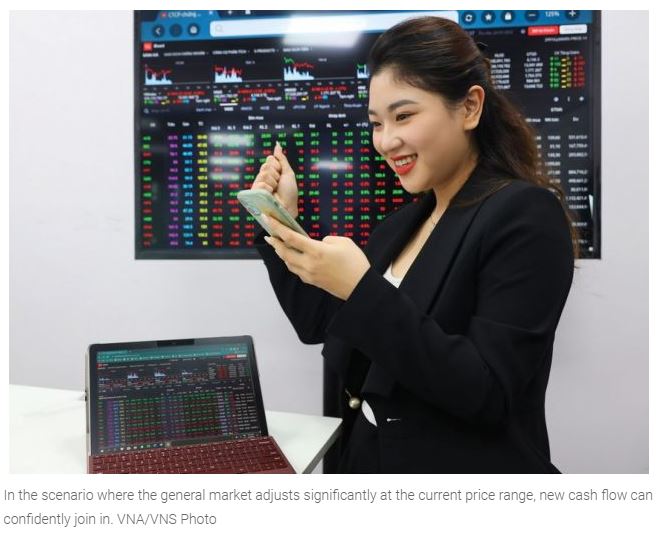Vietnam: Cash flow waits to step in as interest rates fall
Banks’ reducing deposit interest rates is driving cash flow back to the stock market, but investors are advised to take a prudent approach.
HÀ NỘI – Banks’ reducing deposit interest rates is driving cash flow back to the stock market, but investors are advised to take a prudent approach.
The main factors that are expected to affect the market that investors need to pay attention to include inflationary pressure, exchange rates, the operation of monetary policy of the State Bank, interest rate fluctuations; risks associated with the corporate bond market; the first quarter business results reporting season as well as the 2023 shareholder meeting season.
The global stock market recently traded strongly as inflation in the US dropped rapidly and the Fed and other major central banks were entering the final stage of the interest rate hike cycle, while China is about to fully reopen the economy after a long blockade due to the COVID-19 pandemic.
Nguyễn Đức Anh, Director of Strategy and Macro, KB Securities Việt Nam, said that the recovery of the VN-Index in the three months before Tết was in line with macro changes. The risk of a deep correction from the current price range is not high, although profit-taking pressure may cause a strong shake-up.
Đinh Quang Hinh, Head of Macroeconomics and Market Strategy Department, VNDIRECT Securities Company, predicts that at the moment, many domestic macro factors are improving.
Exchange rate pressure has decreased significantly, leading to a strong return of foreign indirect investment inflows. Interest rates on government bonds have fallen sharply in the past month, which is an early indicator that the market interest rates for mobilisation and lending may soon be adjusted down.
Interest rates and exchange rates are always the factors that have a great impact on the trend of the stock market, when these factors improve, the pressure on the market is somewhat removed.
The market in the first half of 2023 still faces risks related to the decline in earnings of listed companies in the context of economic growth and slowing exports. In addition, difficulties in the corporate bond market and the real estate market have not been resolved.
According to VNDIRECT, macro factors are gradually improving, so it is less likely that the market will fall to a deeper bottom than the old bottom that was set in November last year around 900 points.
Bùi Văn Huy, Director of HCM City Branch, DSC Securities Company, said that the stock market might fluctuate to establish a medium-term bottom before forming a clear uptrend in the second half of this year. However, the zone of 950-980 points is a strong support zone, and is hard to be penetrated.
The market’s deep correction, if any, is an opportunity to buy in, according to Huy.
In the scenario where the general market adjusts significantly at the current price range, new cash flow can confidently join in.
However, Đức Anh said that the recent increase in the market was consistent with the macro changes and it would be difficult for the VN-Index to have a deep correction if there were no new negative impact factors.
The group of information technology, securities and public investment industries would be in attractive valuation areas for investors to consider disbursing.
Since the beginning of 2023, the market has clearly diverged, some stocks surged to historic peaks such as Phú Nhuận Jewelry (PNJ), Vietcombank (VCB), while there were still stocks that moved sideways in low areas such as Novaland (NVL) and Phát Đạt Real Estate (PDR).
Nguyễn Tuấn Anh, founder of Finpeace, said the current cash flow was at a low average level and belonged to professional investors, partly reflected in the continuous net buying of foreign funds. The market showed signs of waiting for more positive information from listed companies, especially before and after the 2023 general meeting of shareholders to clearly see the direction of the business, as well as the next developments from macroeconomic policy.
“At the beginning of this year, investors can still follow last year’s focused groups such as banks, insurance, and electricity. However, from the end of the second quarter of this year onwards, investors should focus on high-growth business groups such as technology, retail, retail banking, and securities. In addition, investors can pay more attention to the ability to grow revenue and market share,” he said.
After a generally difficult period, the market often shows businesses that suddenly reaches a high position thanks to sudden improvements in technology and product upgrades. The 2023 General Meeting of Shareholders is the best place for investors to define the difference in the growth orientation of listed companies, from which they will have a closer look at the business to make suitable investment decisions. VNS
Source: https://vietnamnews.vn/economy/1485703/cash-flow-waits-to-step-in-as-interest-rates-fall.html


 English
English




